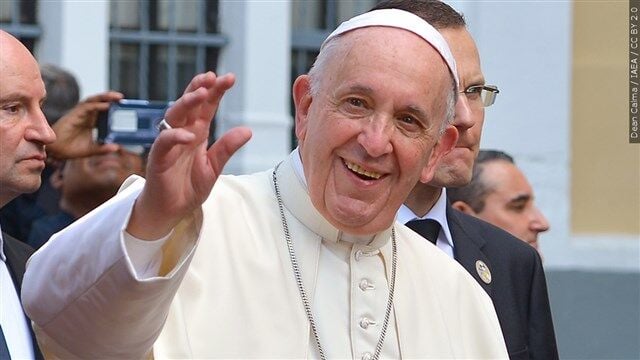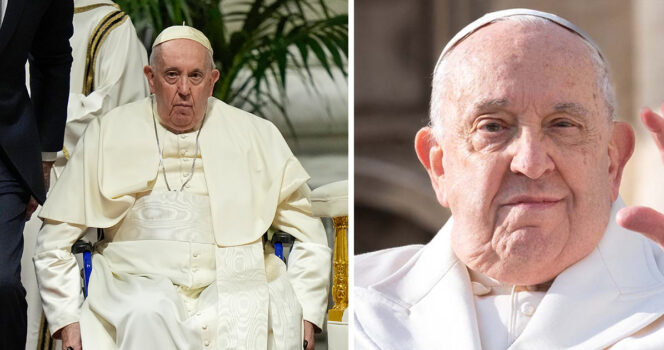Pope Francis, who passed away on Monday, April 21, 2025, at the age of 88, had a profound and peaceful perspective on death. Two months before his passing, the Pope expressed his belief that death is not an end but a “new beginning.” This statement was part of a preface he wrote for a book by Cardinal Angelo Scola, Archbishop Emeritus of Milan, in February 2025. His words offer a glimpse into his spiritual views and provide comfort to those mourning his loss.
Pope Francis’ Final Moments
Pope Francis, born Jorge Mario Bergoglio in Buenos Aires, Argentina, on December 17, 1936, led the Catholic Church as its 226th pope from 2013 until his passing. His leadership was marked by compassion, humility, and an unwavering commitment to social justice. Pope Francis, known for his personal approach to faith and his care for the marginalized, had battled health issues throughout his papacy, including a severe case of pneumonia earlier in 2025, which required 38 days of hospitalization.
Despite doctors’ advice to rest, the Pope continued to work diligently during his recovery. Just days before his passing, Pope Francis made a public appearance, delivering the traditional Urbi et Orbi blessing on Easter Sunday. He rode through St. Peter’s Square in the Popemobile, greeting the crowd, including children, with a smile and wave. This final public appearance demonstrated his resilience and devotion to his ministry.
Later that day, Pope Francis rested and had a quiet dinner before going to sleep. The following morning, he unexpectedly fell ill. Just before slipping into a coma, he made a final gesture of farewell to his trusted nurse and personal healthcare assistant, Massimiliano Strappetti. An hour later, Pope Francis passed away peacefully in his quarters at Casa Santa Marta.

Pope Francis’ Perspective on Death
Pope Francis, throughout his papacy, often emphasized the importance of faith, hope, and the transformative power of love. His view on death, expressed in his written words, reflects a deep sense of spiritual understanding. In the preface for Cardinal Scola’s book, Pope Francis wrote, “Death is not the end of everything, but the beginning of something. It is a new beginning… eternal life, which those who love already begin to experience on earth within the daily tasks of life, is beginning something that will never end.”
Pope Francis further explained that eternal life is something that will be experienced in a way that humans cannot fully comprehend. “And it is precisely for this reason that it is a ‘new’ beginning, because we will live something we have never fully lived before: eternity.”
His words offer a sense of peace and hope, reminding the faithful that death is not to be feared but embraced as a continuation of the journey into eternity. This belief aligns with his teachings throughout his papacy, where he emphasized love, compassion, and the importance of a deeper relationship with God.

Preparations for Pope Francis’ Funeral
Following Pope Francis’ death, preparations for his funeral and burial began immediately. In accordance with his wishes, Pope Francis chose not to be buried in the Vatican, as was the tradition for many of his predecessors. He requested that his tomb not feature any mention of his papal title. His humility and desire for simplicity were evident in this final request, reflecting his focus on the values of faith and service rather than personal glory.
The Vatican and its clergy began making arrangements for the funeral, with the College of Cardinals overseeing the process. In the days following his passing, the papal conclave will begin the process of electing a new pope. The conclave is a secretive assembly of cardinals that typically takes place within 15 to 20 days of the pope’s death.

Pope Francis’ Legacy and Impact
Pope Francis leaves behind a legacy that has reshaped the Catholic Church in profound ways. He worked tirelessly to address global issues such as poverty, climate change, and migration, focusing on the dignity of all human beings. His leadership was marked by a commitment to inclusivity and dialogue, encouraging the faithful to embrace mercy and forgiveness.
One of the most significant aspects of Pope Francis’ papacy was his ability to connect with people on a personal level. Whether through his outreach to marginalized communities or his focus on creating a Church that serves all people, his approach to leadership was one of compassion, humility, and service.
His views on death, as expressed in his final writings, offer a profound and comforting perspective for his followers. Pope Francis believed that life is not a linear journey but a continuous transition into eternity, where love and faith persist beyond the physical realm.
Conclusion: A New Beginning
As the Catholic Church and its followers mourn the loss of Pope Francis, his words and teachings continue to inspire and guide. Pope Francis viewed death not as an end but as a new beginning, a belief that provides hope and peace in the face of loss. His life and legacy will live on in the hearts of millions, and his final words about eternal life will serve as a source of comfort to those who follow his teachings.
Sources:
- Vatican News – https://www.vaticannews.va
- Sky News – https://www.sky.com
- BBC News – https://www.bbc.com

